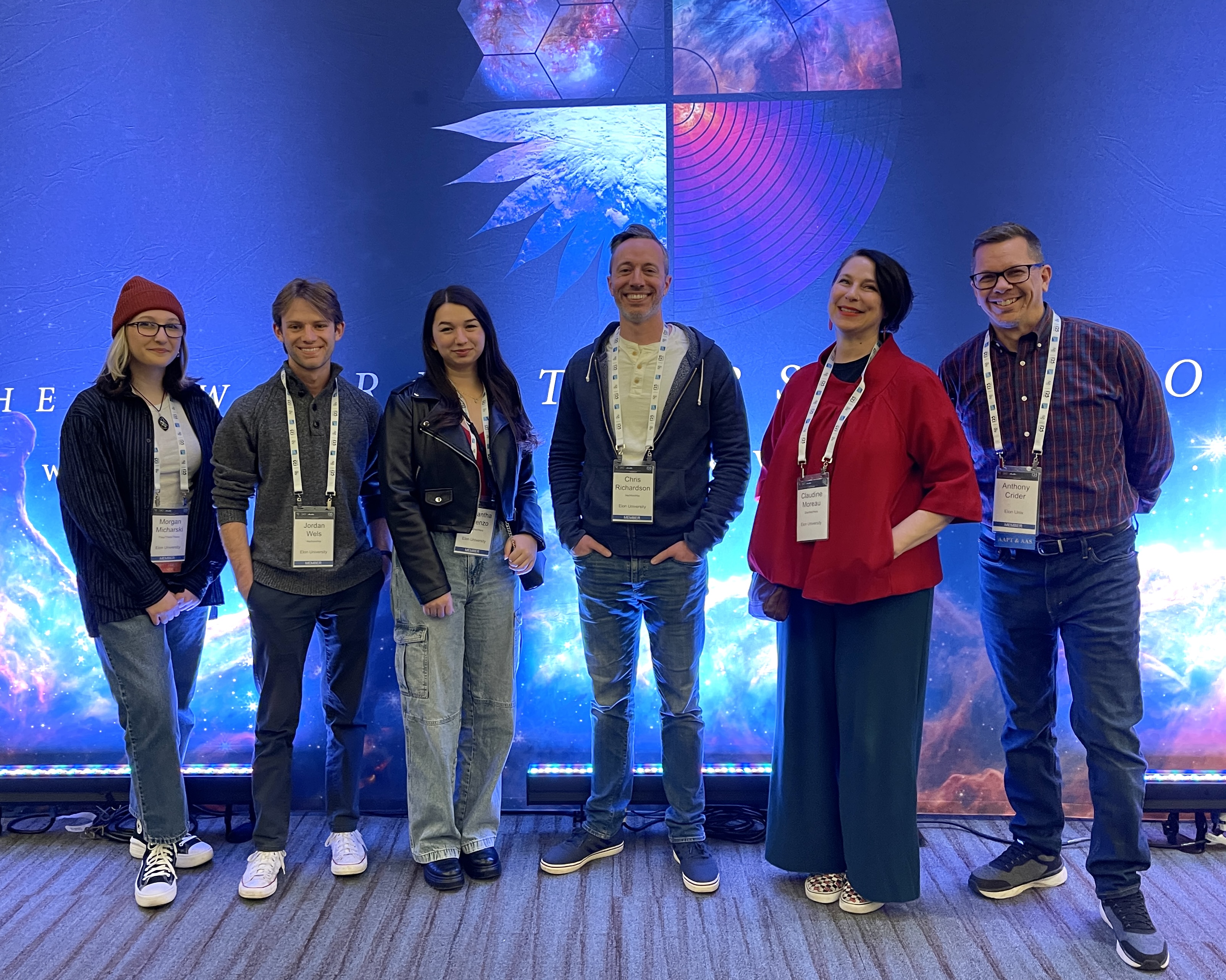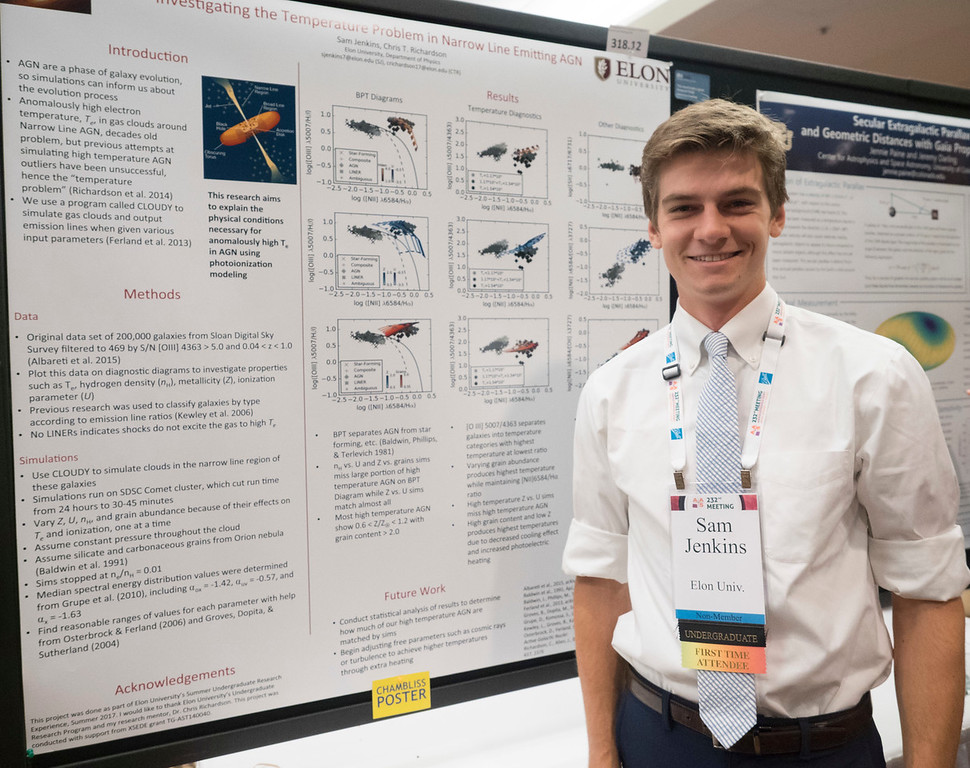- Home
- Academics
- Arts & Sciences
- Physics & Astronomy
- Astronomy Program
Astronomy Program
An Astronomy Degree at Elon: Driven by Big Questions
 Astrophysics and astronomy ultimately focus on broad questions with deep implications. Are we alone? What is history of our galaxy, the Milky Way? What is the fate of the Universe?
Astrophysics and astronomy ultimately focus on broad questions with deep implications. Are we alone? What is history of our galaxy, the Milky Way? What is the fate of the Universe?
These questions motivate our majors to pursue the wonder instilled in them from looking up at the night sky or from remembering the first time they looked through a telescope. Society at large unites around the prospect of exploring the universe, whether it’s through science fiction or actual space missions that bring our ideas to reality.
In addition to careers in astronomy, graduates of our programs find success in other fields, like business and journalism, based on the curiosity required to ask challenging questions and the skill set required to solve them.
Astronomy vs. Astrophysics? A Robust Curriculum in Both Fields
Elon University is currently the only degree-granting institution for astronomy and astrophysics in North Carolina. We offer two degrees in the program: Astronomy B.A and Astrophysics B.S.
Astronomy is the study of the universe beyond Earth’s atmosphere, including celestial objects and phenomena. Astronomers use telescopes and other instruments to observe and measure space objects, and develop theories about the universe. Topics include planets, stars, galaxies, black holes, and cosmic events.
Astrophysics is a branch of astronomy focused on the physical and chemical properties of celestial objects. Astrophysicists use physics concepts, mathematics, and data to understand how these objects behave and evolve. Topics include stellar formation, the energy of stellar systems, and the relationship between energy and the evolution of the system

Chambliss Award recipient Sam Jenkins during the Coffee/Posters/Exhibitors session at the American Astronomical Society’s 232nd meeting in Denver, Colorado, 2018. Photo by Phil McCarten/Corporate Event Images, © 2018 American Astronomical Society.
Our astronomy degree curriculum focuses on uncovering content about planets, stars, galaxies, and cosmology at both introductory and advanced levels. The introductory courses Planetary Astronomy and Galactic Astronomy provide the framework for these topics, while Modern Astrophysics and Advanced Astrophysics revisit them with more in-depth analysis. After taking Introduction to Astronomy, majors often serve as Teaching Assistants for the nighttime astronomy lab, guiding non-majors through operating telescopes and using their phones for astrophotography.
In pursuing degree in astronomy at Elon, students are encouraged to combine astronomy with another discipline, which Elon University makes possible by emphasizing connections across disciplines and courses. Students in astronomy have a double majored in english, music, and computer science to create a novel skill set for a future career.
The astrophysics degree is tailored to students who want to continue their education in graduate school and seek a professional career in the field. Our students have attended graduate school at institutions such as MIT, Tufts University, UNC-Chapel Hill, and Clemson University.
We emphasize that the fundamental principles learned in physics courses also translate to astrophysical phenomena, which creates a well-rounded foundation for graduates. Astrophysics majors also complete a semester of research, and many conduct research spanning several years, giving them the avenue to explore their own questions.
Develop Unique Skills with an Astronomy Degree
Observations are an inherent part of the scientific process in astronomy, the most visually based science. As such, visual literacy is developed in all of our classes, giving graduates the skills to analyze detailed images, interpret complex graphs, and use visual aids.
Similarly, astrophysics and astronomy majors are positioned to play an essential role in a data-driven world. The era of “big data” forces astronomers to find novel ways to coherently display relationships found in observations and simulations.
To assist with this, every major develops the ability to write computer code, a crucial skill in the world today. Scientific results are only valuable if shared with others, and our majors are routinely tasked with writing and presenting their findings to audiences with a wide range of backgrounds. Being effective communicators sets our graduates apart from those at other institutions and lies at the heart of an Elon education.
What can I do with an Astronomy Degree?
Students graduating with either an astronomy-related major or minor have pursued numerous career paths. The computational skills required in astronomy set up graduates in jobs geared towards data analytics and data science. The writing aspects of the profession have inspired graduates to author fictional short stories about astronomy-related phenomena and edit online publications for popular media outlets like Science News. Many often decide to attend graduate school to continue their education before entering the job market, and our department has a strong track record of acceptance into high-ranking programs.